
ENVIRONMENT DEVELOPMENT AND SUSTAINABILITY
Scope & Guideline
Fostering Knowledge Exchange for Global Sustainability
Introduction
Aims and Scopes
- Sustainable Development and Policy Frameworks:
The journal emphasizes the development of policies that promote sustainability in various sectors, including agriculture, urban development, and energy. It explores how legislative frameworks can enhance environmental protection while fostering economic growth. - Climate Change and Environmental Impact Assessments:
Research on the effects of climate change and strategies for adaptation and mitigation is a core focus. This includes studies on environmental impact assessments and their role in guiding sustainable practices. - Technological Innovations for Sustainability:
The journal highlights the role of technological advancements, such as AI and IoT, in promoting sustainability. It looks at how these technologies can optimize resource use and reduce carbon emissions. - Socio-Economic Factors in Environmental Sustainability:
A significant aspect of the journal is examining how socio-economic factors influence environmental sustainability. This includes studies on community engagement, public awareness, and economic incentives for sustainable practices. - Biodiversity and Ecosystem Services:
The journal covers research related to biodiversity conservation and the ecosystem services that support human well-being. It addresses the importance of maintaining ecological balance for sustainable development. - Circular Economy and Waste Management:
There is a strong emphasis on circular economy principles, particularly in waste management and resource recovery. The journal explores innovative approaches to minimize waste and promote recycling.
Trending and Emerging
- Digital Transformation and Sustainability:
An emerging theme is the relationship between digital transformation and sustainability. Research is increasingly exploring how digital tools and technologies can enhance sustainability practices across various sectors. - Climate Resilience and Adaptation Strategies:
There is a growing focus on developing climate resilience strategies, particularly in vulnerable communities. This includes examining adaptive measures in agricultural practices to cope with climate variability. - Green Finance and Investment:
Research related to green finance is trending, with a focus on how financial mechanisms can support sustainable development initiatives and influence corporate behavior towards environmental responsibility. - Integration of ESG Factors in Business Practices:
The incorporation of Environmental, Social, and Governance (ESG) factors into business practices is becoming increasingly relevant. Studies are exploring how these factors affect corporate sustainability and performance. - Public Participation in Environmental Governance:
There is a rising interest in public participation and community engagement in environmental governance. Research is focusing on how stakeholder involvement can enhance the effectiveness of sustainability initiatives. - Sustainable Urban Development:
Emerging studies are focusing on sustainable urban development, particularly in the context of smart cities. This includes the integration of green infrastructure and efficient resource management in urban planning.
Declining or Waning
- Traditional Agricultural Practices:
Research on traditional agricultural practices is less frequent, as the focus shifts towards technological interventions and climate-smart agriculture. This decline may reflect the industry's evolution towards more modern and efficient farming methods. - General Environmental Awareness Campaigns:
There seems to be a decrease in papers solely focused on general environmental awareness campaigns, as the journal increasingly emphasizes measurable impacts and policy-driven initiatives. - Historical Analysis of Environmental Policies:
Studies that focus on historical analyses of environmental policies are becoming less common, with more emphasis placed on current and future-oriented research that addresses present challenges. - Urbanization without Sustainability Considerations:
There is a declining interest in discussing urbanization issues that do not incorporate sustainability considerations. The journal increasingly prioritizes research that addresses the environmental impacts of urban development.
Similar Journals

Geography and Sustainability
Exploring Interdisciplinary Solutions for Environmental Challenges.Geography and Sustainability is a prestigious, peer-reviewed journal published by Elsevier, focusing on the interdisciplinary fields of geography, ecology, and environmental science. As an Open Access publication since 2020, it aims to provide a platform for the dissemination of high-quality research that addresses critical sustainability challenges facing our planet. Based in China, the journal navigates through an impressive array of categories, all classified in the Q1 Quartile rankings for 2023, showcasing its top-tier status in areas such as Earth-Surface Processes, Geography, Planning and Development, and Nature and Landscape Conservation. With its notable impact factors—ranked 2nd in Earth and Planetary Sciences and 3rd in Environmental Science—it attracts contributions from leading experts and emerging scholars alike. Researchers, professionals, and students seeking to advance the scientific understanding of sustainability and its geographical implications will find indispensable resources and innovative findings within the pages of this journal.

Observatorio Medioambiental
Exploring Solutions for Contemporary Environmental ChallengesObservatorio Medioambiental is a premier journal dedicated to advancing the understanding of environmental science and policy, published by UNIV COMPLUTENSE MADRID, SERVICIO PUBLICACIONES. With a strong commitment to scholarly excellence, this journal serves as a vital platform for researchers, professionals, and students interested in addressing contemporary environmental challenges through interdisciplinary studies. Although currently not listed as an Open Access journal, it maintains high academic standards, ensuring that published research contributes significantly to the field. The journal fosters the dissemination of knowledge regarding ecological conservation, sustainable development, and environmental management practices. By providing a rigorous peer-reviewed environment, Observatorio Medioambiental plays a crucial role in shaping informed and sustainable environmental policies and practices on both local and global scales.
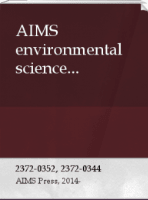
AIMS Environmental Science
Connecting Global Minds to Tackle Environmental IssuesAIMS Environmental Science is a reputable peer-reviewed journal dedicated to advancing our understanding of environmental science through rigorous research and innovative methodologies. Published by the American Institute of Mathematical Sciences (AIMS), this journal provides an essential platform for researchers, professionals, and students alike, offering open access to cutting-edge studies since its establishment in 2014. With an ISSN of 2372-0344 and an E-ISSN of 2372-0352, it serves a global audience from its base in the United States. As part of the Scopus rankings, the journal is positioned in the third quartile (Q3) for the field of Environmental Science, showcasing its emerging role in the community with a ranking of 114 out of 233 in General Environmental Science, placing it in the 51st percentile. From 2015 to 2024, the journal focuses on a broad range of topics within environmental science, aiming to bridge gaps between theoretical research and practical application. By providing open access to its content, AIMS Environmental Science ensures that vital environmental research is accessible to a wider audience, fostering collaboration and innovation in tackling some of the most pressing environmental issues of our time.
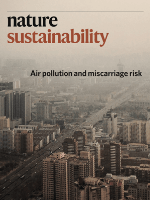
Nature Sustainability
Leading the charge in interdisciplinary sustainability studies.Nature Sustainability, published by NATURE PORTFOLIO, is a leading international journal that champions cutting-edge research in sustainability across a multitude of disciplines. Since its inception in 2018, the journal has made significant strides in publishing high-impact articles that address the pressing challenges of our time, from ecology and food science to urban studies and renewable energy. With an impressive impact factor and consistent Q1 quartile rankings in various categories such as Global and Planetary Change and Management, Monitoring, Policy and Law, it stands at the forefront of research dissemination in sustainability. Although access options remain undefined, the journal reaches a wide audience determined to drive impactful change through innovative research within the realm of environmental and social sciences. Nature Sustainability not only illuminates pathways toward sustainable practices but also fosters interdisciplinary collaboration, making it an essential resource for researchers, professionals, and students committed to advancing sustainability initiatives globally.

Environmental Engineering and Management Journal
Exploring innovative pathways in environmental management.Welcome to the Environmental Engineering and Management Journal, a pivotal platform for disseminating knowledge and innovative research in the fields of Environmental Engineering, Management, Monitoring, Policy, and Law. Published by GH Asachi Technical University of Iasi in Romania, this journal has been committed to fostering discussions and advancements in environmental solutions since its inception in 1988, with continuous publication from 2002 to 2024. While classified in the Q4 category across various environmental disciplines in 2023, it remains an important resource for scholars and practitioners navigating the complexities of pollution and environmental management. With an ISSN of 1582-9596 and an E-ISSN of 1843-3707, this journal encourages submissions that address pressing ecological challenges and provide actionable insights. Although currently not open access, it seeks to expand its reach and relevance within the global academic community. Join us as we explore critical environmental issues and contribute to sustainable practices worldwide.
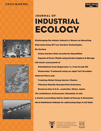
JOURNAL OF INDUSTRIAL ECOLOGY
Innovating the Future of Ecology and IndustryJOURNAL OF INDUSTRIAL ECOLOGY, published by Wiley, is a leading academic journal that focuses on the intersection of industrial practices and ecological sustainability. With an ISSN of 1088-1980 and an E-ISSN of 1530-9290, this journal has established itself as a premier outlet for research in economic, environmental, and social sciences, evidenced by its Q1 rankings in key categories such as Economics and Econometrics, Environmental Science, and General Social Sciences as of 2023. Spanning over two decades from 1997 to 2024, it offers invaluable insights into innovative approaches for designing sustainable industrial systems, informing policy decisions, and advancing interdisciplinary collaborations. While the journal does not currently offer open access options, its high impact in the field—illustrated by its impressive Scopus rankings, where it ranks 5th among 275 in General Social Sciences and 23rd among 233 in General Environmental Science—reinforces its importance to researchers, professionals, and students dedicated to the principles of sustainable development and industrial ecology.

Environmental Sciences Europe
Shaping sustainable futures through open research.Environmental Sciences Europe is a leading peer-reviewed journal published by SPRINGER, dedicated to advancing research in the field of environmental science, with a specific focus on pollution and its mitigation. Since its transition to Open Access in 2011, the journal has been committed to disseminating high-quality research without barriers, thereby ensuring that critical knowledge is freely accessible to researchers, practitioners, and policymakers around the globe. Based in Germany and with a commendable Q1 ranking in Pollution for 2023, the journal stands out in the Scopus rankings, occupying the 23rd position out of 167 in its category, reflecting its significant impact in shaping environmental discourse. With a convergence of global research efforts projected until 2024, Environmental Sciences Europe aims to provide a vital platform for scholarly communication and collaboration, ultimately contributing to sustainable solutions for pressing environmental challenges.

Visnyk of V N Karazin Kharkiv National University-Series Geology Geography Ecology
Bridging disciplines to enhance our understanding of Earth's systems.Visnyk of V N Karazin Kharkiv National University-Series Geology Geography Ecology is a prominent academic journal dedicated to the fields of geology, geography, and ecology. Published by the esteemed V N Karazin Kharkiv National University, this journal aims to disseminate high-quality research findings and theoretical perspectives that advance understanding in these critical scientific areas. With the ISSN 2410-7360 and E-ISSN 2411-3913, it serves as a vital platform for scholars, researchers, and students striving to contribute to environmental science and sustainable development. The journal promotes open access, ensuring that research is readily accessible to a broad audience, thus facilitating the exchange of knowledge across borders. Its commitment to scholarly excellence makes it an essential resource for anyone engaged in the study of Earth's systems and their interconnections. For additional information and to submit your research, please visit the journal's website.
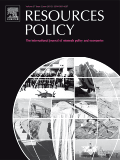
Resources Policy
Fostering Critical Discussions in Economics, Law, and SociologyResources Policy, published by ELSEVIER SCI LTD, is a prestigious journal that has been at the forefront of advancing knowledge in the fields of Economics, Law, and Sociology since its inception in 1974. With an impressive Q1 ranking in multiple disciplines—including Economics and Econometrics, Law, Management, Monitoring, Policy and Law, and Sociology and Political Science—this journal showcases high-impact research and insights that are vital for academics, policymakers, and practitioners alike. With Scopus rankings placing it in the top percentiles of its respective categories, Resources Policy fosters interdisciplinary dialogue, promoting innovative solutions and policies concerning the sustainable management and use of resources. While currently not an open-access publication, the journal ensures that its rich content is accessible to those pursuing rigorous research and professional excellence. As we approach its 50th anniversary in 2024, Resources Policy continues to be an essential platform for critical discussions, evaluation, and advancements in resource management.
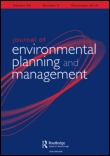
Journal of Environmental Planning and Management
Driving critical insights into sustainable practices and policies.The Journal of Environmental Planning and Management, published by Routledge Journals, Taylor & Francis Ltd, is a leading academic journal dedicated to advancing the field of environmental science through innovative research and critical analysis. With a robust impact factor and categorized in Q1 across multiple disciplines, including Environmental Science, Geography, and Fluid Flow, this journal holds a prestigious position in the academic community. It serves as a vital platform for researchers, professionals, and students interested in the complexities of environmental management, policy, and planning, promoting insightful discourse on sustainable practices and innovative solutions. Although the journal does not currently offer Open Access options, it remains widely accessible through institutional subscriptions, ensuring that pertinent research reaches a broad audience. Since its inception in 1992, the journal has shown a commitment to excellence, making significant contributions to our understanding of environmental issues and the interplay between human activity and natural systems. The Journal of Environmental Planning and Management invites submissions that not only push the boundaries of existing knowledge but also foster interdisciplinary collaboration in the quest for sustainable development.